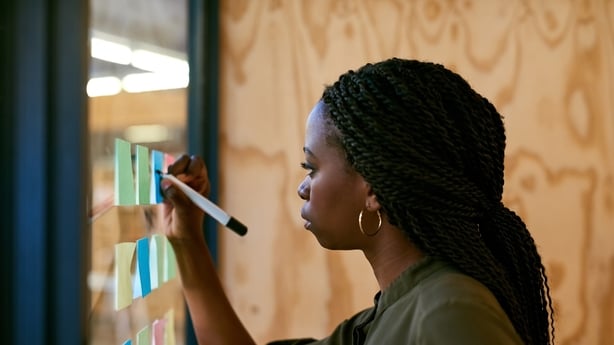Life coaches the world over are helping others through everything from anxiety attacks to getting that promotion. But what exactly is a life coach, and should we trust them with our cash? Kate Demolder writes.
Can a coach guide you to succeed? For a growing number of people, the answer is yes. More and more people are turning to life coaches to gain everything from confidence in motherhood, to success in business, to a beam of light after a slump.
The vague term is believed to have been born in the late-20th century, when the practice of goal-setting and talk-therapy-style sessions set to improve an individual's circumstances and well-being became more commonplace. And today, business is booming.
As per the International Coaching Federation, the industry is worth $4.56B (€3.7B), and between 2019 and 2022, the number of life coaches rose by 54 per cent, making it one of the fastest-growing careers in the US.
In Ireland, the vocation is skyrocketing, too. While no official statistics exist, a quick Google search for 'life coaches Ireland’ brings up reams of options, based all around the country, all offering different versions of guidance, help, and the purported secrets to success.

One such coach is Mark Fennell, an established and accredited individual who bills himself as a High Performance Life Coach & Business Coach. His journey to the vocation began via osmosis.
"My parents were involved in charity work and would bring me along to help out with inner city charity work," he smiles. "I saw the difference that made, which eventually got me into youth work. I suppose I learned that by helping someone believe in themselves, that they can change the trajectory of their lives. I got the bug and it really gave me a sense of purpose."
Fennell eventually became an executive coach, helping people with their career, as well as anything else that could "unlock" their "potential". Today, 23 years in, he hates the term 'life coach'.
"It’s so vague and unclear," he says. "There's also a lot of fluff out there. It seems like everyone and their mother is a life coach now. Like, there’s nothing inherently wrong with that – if someone wants to help someone else, that’s not a bad thing. But coaching runs a lot deeper; anyone accredited will tell you that."
Among the myriad life coaches out there, many operate with integrity, providing thoughtful and structured advice to their clients to help them through challenging times. However, the unregulated nature of the industry can make it tricky to decipher what’s what.
In Ireland, life coaches must be QQI (Quality and Qualifications Ireland - the state agency responsible for promoting quality, integrity, and accountability in Ireland's further and higher education system) certified to be accredited.
"Without that training, if a vulnerable person were to come to you with deep trauma, things could get dangerous," Fennell says. QQI Life Coach courses can range in fees, but Fennell shares that other, lesser recognised courses are available too. "Unfortunately, the bottom line is that you can go and get a piece of paper. The next question is, does it actually hold weight?"

"There are a lot of people with good intentions who want to be a coach because. On the surface, it looks like an easy job, and maybe they have had they own positive personal growth experience so want to guide other people through what they experienced," says marketeer Niamh Donoghue.
She sought the help of a business coach whose work she insists was "life changing". "But in reality without the depth of study and training to be any good, they are way out of their depth."
It’s a two-way street, she notes. "The person hiring the coach has to push them harder on their credibility, and then we don’t have such a low barrier to entry. Hiring a coach is like hiring someone on your team; you would ask for references."
For life coach Judith McAdam, her work allows clients to hone in on the spiritual. "I’m a theologian, a Reiki healer, a kinesiologist, a spiritual life coach, an author and basically someone who helps people move forward and manifest without fear."
McAdam is 27 years in the industry, and first gained an interest when she herself needed a little help. "Someone close to me was sick and I wanted to help, so I tried Reiki and immediately became hooked. I then did vibrational kinesiology training and began learning about anatomy, physiology and how our energy affects us."
From here, she developed her own techniques, and regularly uses them in one-on-one sessions, on international retreats or in workshops.
Her first appointment usually informs her practice. She asks questions like "why are you here?" and "what kind of life do you want to create for yourself?". McAdam regularly finds clients who struggle financially but need her help, too. "I have a regular group workshop called Manifestation 365 that’s €27 a month, and I also do private sessions."
Some of her clients contribute to a pay-it-forward system which donates free sessions to people who need them. "I never turn anyone away from the door, I will just find a way of working with them as best I can."
There's an understanding that the pandemic led to an unprecedented boom in life coaching. This happened twofold. Firstly, the time left many struggling with their mental health, leading them to look for guidance as their inner minds felt jumbled. Secondly, a great re-evaluation of personal priorities, goals and values also took place during that time.
A number of the life coaches working today, too, experienced both of those: a transition into the profession following a difficult time and career reevaluation.
For women-centric life coach Jennifer, known as The Wellbeing Warrior, the career pivot from prompted by a friend. "I experienced postnatal depression after having both of my children, and it completely shifted my perspective," she says. "I began sharing my journey on Instagram back in 2018—talking about mental health, postnatal struggles, self-care, and what it looked like trying to navigate it all while working full-time as a teacher. It started out as a space for me to process and reflect, but I quickly realised it was resonating with other women too."
At the start of the pandemic, she enrolled in a neuroscience-based coaching programme: "That training helped me not only support others, but also make sense of my own experience with postnatal depression. For the first time, I could understand what was really happening in my brain and body—not from a place of shame or blame, but with deep compassion and insight. That’s what I bring into my work now as Life Coach Jennifer, blending science, soul, and lived experience to support women in truly life-changing ways."

Although some accrediting bodies exist for life coaches, such as the International Coaching Federation, there are presently no legal standards to enter the profession.
Though life coaching can feature a myriad, most coaches seem to cater to the genres of career, relationships, family and personal development. They aim, as it were, to remove roadblocks and provide a clearer picture, with many of them specialising in specific styles or genres.
Compliance manager Kate Dillon attended a life coach for "life advice, guidance and navigation".
"We focused on confidence in business and owning my opinion! It was brilliant! Did small exercises and then just built it up! Genuinely, didn't get the hype, but it actually made a huge difference! Ended up getting a promotion within six months!"
In Ireland, most life coaches charge between €60 and €150 an hour, with opportunities to up the ante financially for private sessions. In many ways, on the outside, it can appear similar to therapy, but according to Jennifer, it is markedly different.
"Life coaching is entirely future-focused and results-driven," she says. "Though we might delve into your past to unknot certain ties, you are meeting the person where they’re at." "If someone came to me with trauma, I'd be sending them to a therapist," Fennell echoes.

Fennell has had examples of clients who have gone to different life coaches only to find disappointment. "That’s generally because they’re working off a template rather than actual training," he says. "They’ve signed up for an online course, got a bit of a manual, and applied the same approach to everybody. It’s not hugely common, I would say, but it does happen."
Do scams happen? "I haven’t heard of anyone in Ireland, but you do get unregulated people making claims that if you spend time with them, you will make six figures by the end of the year," Jennifer shares.
"That doesn’t happen. You also get people who think that life coaches are a quick fix, and by hiring one, you don’t have to do the work. But, you need to do the work too. It’s an ongoing thing that doesn’t happen overnight."
Each of the coaches I spoke to agreed on one thing: that everyone in this life should try one. "I think everybody needs support," McAdam says. "The more I do this, the more I see that if you get right behind somebody and show love, they flourish."
Everyone can benefit from coaching because everyone can benefit from objectivity, Jennifer shares. "Sometimes, getting advice from friends or family can compound the beliefs you have that are stopping you from doing certain things in the first place."

Most people are trying to navigate and figure out life with the same mindset that's probably creating the problems, Fennell agrees.
"They're trying to see things in a new light with the same eyes that have been seeing things their whole life. And so a coach brings a new dynamic, or a new way of seeing things. Every high performer out there has at least one coach.
"As for teenagers, there’s so much misinformation out there, particularly toxic, chauvinistic influencers - that's who's coaching them now. For young women, it’s perfect, edited images online – they’re their coach. We’re all being coached by someone, whether we realise it or not.
"As for the person with a fixed mindset who doesn't want to grow? Well, then 10 coaches won't help them get to where they want to be."
If you have been affected by issues raised in this story, please visit: www.rte.ie/helplines.
The views expressed here are those of the author and do not represent or reflect the views of RTÉ

